For most of my 20s I felt like a complete failure. I wanted to do big things, yet I couldn’t even handle the small.
I wanted to pursue my dreams, yet all my dreams felt like they were suffocating like a salmon on a summer sidewalk.
At one point I remember literally hoping that my email was broken because that would at least explain why I couldn’t get anyone to email me back.
I began to wonder if truly becoming an “adult” meant letting your dreams die.
It was cleaner that way.
Yet, my biggest dream of publishing a book to encourage our generation was a dream I couldn’t let die. No matter what reality was telling me. It was too important. I knew the pain and frustration of feeling all alone in this twentysomething struggle. I needed to help others find a way out, even if I didn’t fully know the escape route myself.
I just needed to learn new skills to survive on this journey.
So here are the seven skills I learned the hard way in my 20s. I wish I would’ve worked on these skills starting at 21 years old instead of at 26.
This advice can definitely apply to anyone, yet your 20s are setting the direction for the rest of our lives. It’s crucial we point our boat in the right direction now or risk sailing around in circles in some New Jersey harbor.
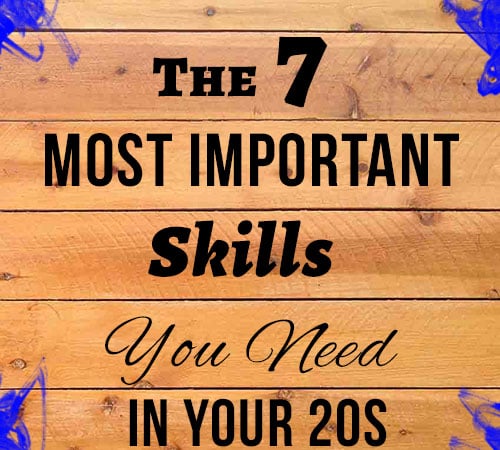
-
The Skill of Having a Long-View
Our generation gets knocked for having big dreams.
Yet, I love our “unrealistic” dreams. You can’t stay realistic and create something new. If you’re going to create something new, by definition it’s not going to be real until you make it so.
As I write in 101 Secrets For Your Twenties:
It’s not our big dreams that are the problem. It’s our krizaaaazzzy timeline of how quickly we wanted those plans and dreams to be sitting on our doorstep with a big Christmas bow.”
Developing a long-view is a skill. It’s the ability to see beyond the immediate setbacks, failures, and successes.
You can’t let your dream always be do-or-die depending on the ebb and flow of the day.
Your twenties are an Ironman marathon, not a sprint.
When you develop a long-view you’re able to take the gritty steps towards your future, even when the present feels enveloped with sullen winter-gray.
When you develop a long-view of your dreams, failure becomes a slight detour, not a complete rock-slide blocking your path.
Success in your 20s is about consistency, humility, and many other unsexy words that won’t make the Twentysomething Hallmark Collection.
As I write in All Groan Up:
Don’t chase your dreams, grow them. It’s just like a farmer whose whole existence relies on one simple belief: If we plant something in good soil and consistently water it, God will spark life underground.”
You might not see the fruit of your dreams for a while. Yet, you can’t stop planting seeds in the ground.
-
Learning The Discipline of Yes or No
Successful people have mastered self-control in the small. The skill of saying no and yes at the right time to the right things.
It’s not complex. It’s simply trusting your gut and having the strength and wisdom to follow its lead.
It could be as simple as consistently saying yes to going to bed at the right time.
Saying no to that next round of drinks. Saying yes to the lunch with a friend of your parents, even though it’s bound to be awkward. Saying no to the relationship that’s as healthy as sipping motor oil. Saying yes to reading and exercise. Saying no to office birthday cake.
We can’t consistently make bad decisions in our 20s and then expect things to magically become better.
-
Knowing How to Leverage the Best of Who You Are
The most important thing to own in your twenties is yourself.
Like renting vs buying a house. When you rent, you don’t put in the time, effort, and money to make your place dramatically better. Why should you?
Yet, when you own your home you’re always looking for ways to improve it, to leverage what you have and make it better.
Same applies for you. It’s like you’re renting the best of who you are, instead of truly owning it and finding ways to make it better.
As Steven Pressfield writes in The War of Art:
Our job in this life is not to shape ourselves into some ideal we imagine we ought to be, but to find out who we already are and become it.”
Self-awareness is a crucial, underrated skill.
No one can do what you do or be who you are. Own it. Leverage it. And watch the returns pour in for years to come.
So the question is – what are the questions you’re asking yourself?
As I write in my new book 101 Questions You Need to Ask in Your Twenties:
I believe there’s nothing more powerful and important in our twenties than the questions we bring to it.
What are your key values, strengths, and pivotal plot points of your story that make you who you are?
If you’re not asking the right questions in your twenties, how are you going to find meaningful answers?
-
Knowing How to Invest Your Time with Purpose
One of the biggest advantages you have in your twenties is time.
No longer is your time tied up with homework and you might not yet have the time-sucking vacuum that is a house and kids.
And every day you have a choice – will I invest my time in things that build or things that destroy?
How wisely do you invest your time, energy, and creativity in things that will produce high returns?
Will you deposit your time in things that will produce value? Or will you continually make withdrawals of your time and spend it on things that will never pay it back?
How you leverage your time now will be the key to your success later.
-
How to Mentor and be Mentored
Every twentysomething should have a mentor and be a mentor.
Twentysomethings should continually be learning to learn and learning to teach.
As I write in 101 Secrets for your Twenties:
“[We can’t] be smothered in Twentysomething. We need to sweeten our lives with some Generational Potpourri–a collection of age ranges with different backgrounds and experiences to spice our lives up.”
I think many people in their 20s and 30s are frustrated that we can’t find support, yet we don’t take the steps to actually look for it.
Don’t expect a mentor to find you.
Maybe it’s pride or a lack of time that’s holding us back from seeking help, but I think the real obstacle is fear.
A fear of being rejected, a fear of commitment, and maybe a fear of someone shining a light on “all our stuff” and challenging us to do something about it.
-
How to Strategically Work a Crappy Job
As I often say, “Crappy jobs are a twentysomething rite of passage.”
Yet, sometimes we can learn the most in the jobs we like the least.
Every job, no matter how terrible, has something to teach. What skills can be gained NOW that you can leverage LATER? Even if you can just find one thing you like about your job. Hone in on that one skill and grow it.
-
How to Fail Well
Growing up we received awards, gold stars, accolades, and most importantly, immediate feedback on how we were doing (most of which was overwhelmingly positive).
After college, immediate feedback is gone, trophies are packed away in your parent’s attic, and tangible success can feel like a fairytale of the past.
In your 20s you must learn to fail well – to fail without calling yourself a failure.
Get unstuck and live your purpose on purpose with my new book 101 Questions You Need to Ask in Your Twenties.

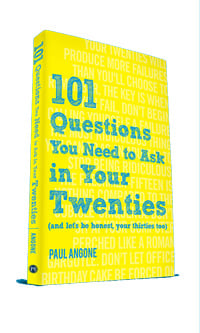


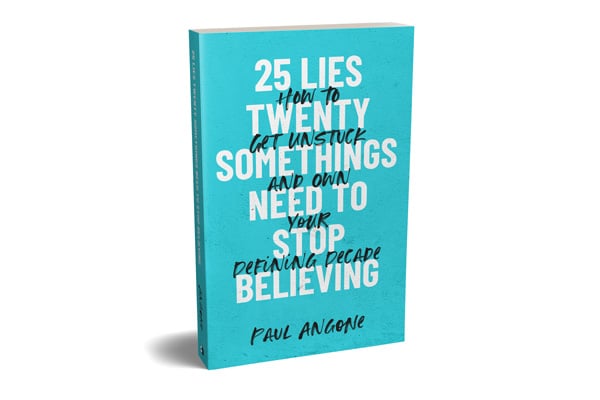
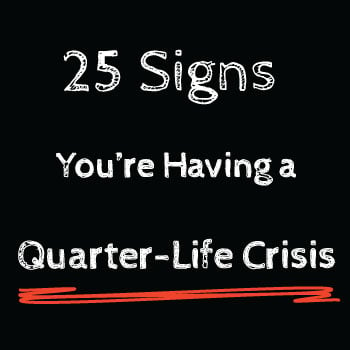

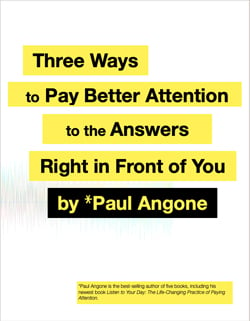
Great article!
Thanks for this, Paul!
The 7th skill is the most difficult for me right now. Sometimes when we fail at something it’s hard to decide whether we should keep on trying or do other things instead. It’s hard to know if it’s a redirection of our life or a test to develop perseverance.
Thanks for the great comment DaniCole. I definitely agree. I think the difference between failure that is telling you to stop vs failure that is telling you to keep going is this — How did you feel in the act of doing what you were doing, even if the end result was a mild or complete failure? Sometimes the best way t figure out if you’re passionate about something is to fail at something, yet you refuse to let it be a failed end-result. It becomes something you cannot, NOT do. That’s when you know you’re tied into something that transcends the immediate results.
Thanks for the feedback, Paul! I really appreciate this.
Oh…That would also help me to develop skill #3.
Your website is really a heaven-sent to us 20-somethings!
Indeed! I second DaniCole! Eloquently written and simple. I would agree with number 7: I feel like often discerning whether the failure is positivity turned inside out, meaning that it is a call to look at my goals in a new way and to work towards them with new inspiration. Other times, I wonder if, as Owl City writes in their lyrics, “Are you just a decoy dream?” When I fail, I wonder whether I am pursuing the “correct” dream for myself, or if it is just me placing barriers in front of myself to cover up fear from what I truly wish to pursue, or whether this failure is pointing me in a direction to help me grow 🙂
I hope that made sense. Anyway, this was enlightening, and I appreciate your writing!
Paul, you have no idea how timely this article is for me! Excellent work!
These are great. Thank you Paul for sharing. Very insightful and practical that all twenty somethings can apply. Awesome.
Thanks Matt!
Love the idea of generational potpourri! I believe strongly it may be the single greatest key to unlocking the other 6 items on this list. Glad to be connected.
Great Article Paul 🙂 Came across this post today and I am glad I did ! Will work on this for sure. Thanks for sharing